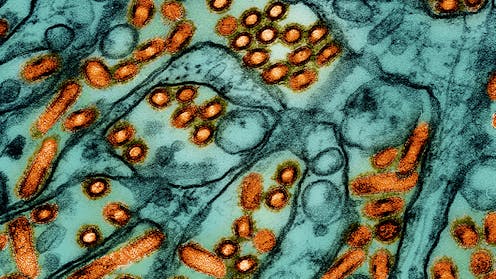
1918 flu pandemic news, research and analysis - the conversation
- Select a language for the TTS:
- UK English Female
- UK English Male
- US English Female
- US English Male
- Australian Female
- Australian Male
- Language selected: (auto detect) - EN
Play all audios:
March 24, 2025 Matthew S Miller, _McMaster University_ COVID-19 exposed the many ways in which we were ill-prepared to prevent and respond to pandemics. Are we applying those lessons to
prevent a bird flu pandemic? November 2, 2023 Alewo Idoko-Akoh, _University of Bristol_ The three flu pandemics of the 20th century originated from birds, making it critical to fight bird
flu. Breakthroughs in gene-editing chickens show promise for eliminating the disease in the future. October 16, 2023 Alice Kelly, _University of Warwick_ Memorialising a pandemic that is
still underway is a challenge. Official commemoration needs to be about remembrance and preparedness. May 17, 2023 Amanda Mascarelli, _The Conversation_ With the emergency phase of the
COVID-19 pandemic in the rearview mirror, at least for now, we look back on a handful of stories that provided sharp insights at key moments in the pandemic. December 16, 2022 Elizabeth
Wrigley-Field, _University of Minnesota_ and Martin Eiermann, _Duke University_ During the 1918 flu pandemic, white people died at similar rates to Black Americans, according to a new study
– a very different pattern than what occurred during the COVID-19 pandemic. February 16, 2022 Joel Christensen, _Brandeis University_ A scholar of ancient Greek literature goes back to the
account of Greek historian Thucydides on the spread of plague and finds parallels in the American response to the health crisis today. January 26, 2022 Maggie Villiger, _The Conversation_
None of our authors can see the future, but many do have expertise that offers insights about what’s reasonable to expect. November 25, 2021 Nathan Abrams, _Bangor University_; Anaïs Augé,
_Bangor University_; Maciej Nowakowski, _Bangor University_, and Thora Tenbrink, _Bangor University_ How the pandemic is reported by the media can influence people’s behaviour. June 10, 2021
Janet Greenlees, _Glasgow Caledonian University_; Andrea Ford, _University of Edinburgh_, and Sara Read, _Loughborough University_ Accounts of previous epidemics – by Samuel Pepys, Daniel
Defoe and Katherine Porter – warn of mistakes that we risk repeating. April 29, 2021 Agnes Arnold-Forster, _McGill University_ A century ago, the end of the 1918 flu pandemic was followed by
a period of prosperity, cultural flourishing and social change known as the Roaring ‘20s. Will the end of COVID-19 launch a similar era? March 23, 2021 J. Alexander Navarro, _University of
Michigan_ Americans were tired of social distancing and mask-wearing. At the first hint the virus was receding, people pushed to get life back to normal. Unfortunately another surge of the
disease followed. November 26, 2020 Tootoooleaava Dr. Fanaafi Aiono-Le Tagaloa, _University of Waikato_ After recent suspected COVID-19 cases and with repatriation flights postponed, Samoa
takes no chances. October 5, 2020 Katherine A. Foss, _Middle Tennessee State University_ This isn’t the first time America’s schoolchildren have studied remotely – and Chicago’s 1937 ‘radio
school’ experiment shows how technology can fill the gap during a crisis. August 11, 2020 Irene Gammel, _Toronto Metropolitan University_ The radical hope we find in the arts, culture and
literature is often a reflection of the times. Drawing from the past there are many examples of how dreams can become a form of resilience. August 3, 2020 Agnes Mueller, _University of South
Carolina_ Narratives throughout history illustrate how pandemics make people grapple with their faith, leading them to deepen religious beliefs or reject them altogether. July 13, 2020 J.
Alexander Navarro, _University of Michigan_ As the US battled the 1918 influenza pandemic, some communities staged contentious battles against wearing masks. Sound familiar? July 12, 2020
Arne Kislenko, _Toronto Metropolitan University_ It’s always dangerous to put present-day events into historic perspectives. That’s especially true when political leaders have compared the
coronavirus pandemic to a war effort. July 6, 2020 Abram L. Wagner, _University of Michigan_ There’s no scientific definition for a wave of disease – and no evidence that the original
onslaught of coronavirus in the US has receded much at all. July 6, 2020 J. Alexander Navarro, _University of Michigan_ How politicians and the public in Denver, Colorado handled the 1918
flu epidemic is relevant to today. June 30, 2020 Melissa Hawkins, _American University_ The recent spike in new coronavirus cases in the US is not due to a second wave, but simply the virus
moving into new populations or surging in places that opened up too soon.